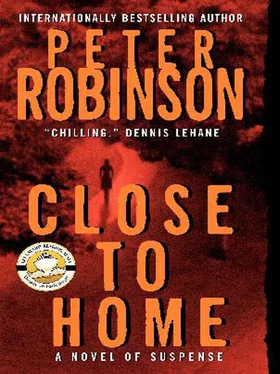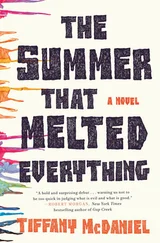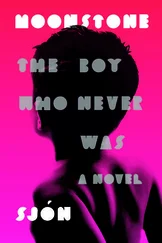“Advanced enough for Rimbaud, Baudelaire, Verlaine?”
“Rimbaud was a mere boy himself. And young teens are often attracted to Baudelaire.”
“‘Le Poëte se fait voyant par un long, immense et raisonné dérèglement de tous les sens,’” Banks quoted, in an accent he hoped wasn’t too incomprehensible. “Does that mean anything to you?”
“Why, of course. It’s Rimbaud’s description of the method he used to make himself a seer . ‘A total disordering of all the senses.’”
“It was written on Luke’s bedroom wall. Did it involve taking drugs?”
“Not that I know of. Not in Luke’s case, anyway. It was about opening oneself to experience of all kinds. To be quite honest, I didn’t approve of Luke’s fascination with Rimbaud. In so many cases like that it’s a fascination with the romantic ideal of the tortured boy-poet, not with the work itself.”
Not wanting to get lost in the realms of literary criticism, Banks moved on. “You felt very close to Luke, am I right?”
“In a way, I suppose. If you really could be close to him. He was slippery, chameleonlike, often moody, quiet and withdrawn. But I liked him and I believed in his talent, if that’s what you mean.”
“If Luke had come to you for help, would you have given it?”
“That depends on the circumstances.”
“If he was running away from home, for example.”
“I’d do all I could to discourage him.”
“That sounds like the official line.”
“It’s the one I’d follow.”
“You wouldn’t harbor him?”
“Of course not.”
“Because we don’t know where he went the day he disappeared. Not after about five-thirty, anyway. But he was last seen walking north on Market Street. That would eventually have brought him to your neighborhood, wouldn’t it?”
“Yes, but… I mean… why would he come here?”
“Maybe he trusted you, needed your help with something.”
“I can’t imagine what.”
“When were the two of you next due to meet?”
“Not until next term. I’m going home next week for the rest of the holidays. My father’s not been well lately and my mother’s finding it hard to cope.”
“I’m sorry to hear that. Where’s home?”
“South Wales. Tenby. A sleepy little place, but it’s by the sea, lots of cliffs to walk on and think.”
“Are you sure Luke never came to see you the Monday before last?”
“Of course I’m sure. He had no reason to.”
“You were only his tutor, right?”
Lauren stood up and anger flashed in her eyes. “What do you mean? What are you trying to insinuate?”
Banks held his hand up. “Whoa. Wait a minute. I was only thinking that he might have considered you as a friend and mentor, someone he could go to if he was in trouble.”
“Well, he didn’t. Look, as it happens, I wasn’t even home the Monday before last.”
“Where were you?”
“Visiting my brother, Vernon.”
“And where does Vernon live?”
“Harrogate.”
“What time did you leave?”
“About five. Shortly after.”
“And what time did you get back?”
“I didn’t. As a matter of fact, I had a bit too much to drink. Too much to risk driving, at any rate. So I slept on Vernon’s sofa. I didn’t come back here until about lunchtime on Tuesday.”
Banks glanced at Annie, who put her notebook aside and pulled the artist’s impression out of her briefcase. “Have you ever seen this girl, Ms. Anderson?” she asked. “Think carefully.”
Lauren studied the drawing and shook her head. “No. I’ve seen the look, but the face isn’t familiar.”
“Not someone from school?”
“If she is, I don’t recognize her.”
“We think she might have been Luke’s girlfriend,” Banks said. “And we’re trying to find her.”
Lauren shot Banks a glance. “ Girlfriend? But Luke didn’t have a girlfriend.”
“How do you know? You said he didn’t tell you everything.”
She fingered the collar of her V-neck. “But… but I’d have known .”
“I can’t see how,” said Banks. “What about Rose Barlow?”
“What about her?”
“I’ve heard she and Luke were pretty friendly.”
“Who told you that?”
“Were they?”
“I believe they went out once or twice earlier this year. Rose Barlow isn’t anywhere near Luke’s league. She’s strictly a plodder.”
“So it didn’t last.”
“Not to my knowledge. Though, as you pointed out, I wouldn’t necessarily be the one to know.”
Banks and Annie stood up to leave. Lauren walked to the door with them.
“Thanks for your time,” Banks said. “And if you do remember anything else, you’ll let us know, won’t you?”
“Yes, of course. Anything I can do,” Lauren said. “I do hope you catch whoever did this. Luke had such a promising future ahead of him.”
“Don’t worry,” said Banks, with more confidence than he felt. “We will.”
Ever since she had rung Banks, Michelle had thought of confronting Shaw with what she had discovered. It would have been easy enough for any authorized person to remove the notebooks and actions from their file boxes. Michelle could have done it herself, so who would think to question an officer of Shaw’s rank? Certainly not Mrs. Metcalfe.
But still she resisted the direct approach. The thing was, she had to be certain. Once something like that was out in the open, there was no taking it back. She had been down in the archives again first thing that morning on another fruitless search, which had at least convinced her that the objects she was looking for were missing. And they should have been there.
What she needed to do now was think. Think about what it all meant. She couldn’t do that in the station with Shaw wandering around the place, so she decided to drive over to the Hazels estate and walk Graham’s route again.
She parked in front of the row of shops opposite the estate and stood for a moment enjoying the feel of the sun on her hair. She looked at the newsagent’s shop, now run by Mrs. Walker. That was where it had all begun. On a whim, Michelle entered the shop and found the sturdy, gray-haired old lady arranging newspapers on the counter.
“Yes, love,” the woman said with a smile. “What can I do for you?”
“Are you Mrs. Walker?”
“Indeed I am.”
“I don’t know if you can do anything,” said Michelle, presenting her warrant card, “but you might have heard we found some bones not long ago and-”
“The lad who used to work here?”
“Yes, that’s right.”
“I read about it. Terrible business.”
“It is.”
“But I don’t see how I can help you. It was before my time.”
“When did you come here?”
“My husband and I bought the shop in the autumn of 1966.”
“Did you buy it from Mr. Bradford, the previous owner?”
“As far as I know we did. The estate agent handled all the details, along with my husband, of course, bless his soul.”
“Mr. Walker is deceased?”
“A good ten years now.”
“I’m sorry.”
“No need to be. He went just like that. Never felt a thing. Brain aneurysm. We had a good life together, and I’m well provided for.” She looked around the shop. “I can’t say it’s exactly a gold mine, but it’s a living. Hard work, too. People say I should retire, sell up, but what would I do with my time?”
“Did you know Graham Marshall at all?”
“No. We moved here from Spalding, so we didn’t know anyone at first. We’d been looking for a nice little newsagent’s shop and this one came on the market at the right price. Good timing, too, what with the new town development starting in 1967, shortly after we got here.”
Читать дальше












